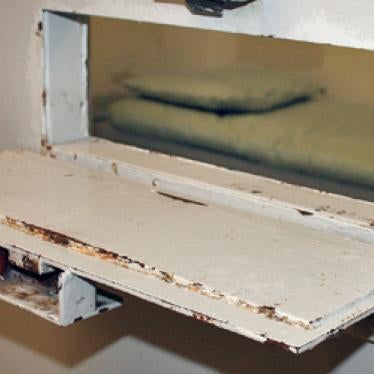"Being in isolation to me felt like I was on an island all alone, dying a slow death from the inside out."
This is just one of the many haunting comments I heard from scores of teenagers describing their experiences in solitary confinement in jails and prisons across the United States.
Solitary confinement is a common practice in US jails and prisons, and one that has been the subject of increasing scrutiny in recent years due to its cruelty. What many people don't realise is that young people are frequently sent to solitary confinement.
An estimated 95,000 people under 18 were held in adult jails and prisons in the US last year. Many are held in isolation for 22 to 24 hours a day, in some cases for weeks or months at a time. While there, they are often denied exercise, counselling, education and family visits.
Sending young people to solitary confinement is the perverse consequence of treating them like adults. They may often think they are, but every parent knows better. It is an ongoing tragedy that our criminal justice system does not.
Solitary confinement
In line with recent advances in neuroscience showing that our brains continue to develop until we are in our mid-20s, the US Supreme Court has repeatedly affirmed, in the context of crime and punishment, that young people are constitutionally different. They are still evolving and in need of age-appropriate treatment and care to grow, mature and be rehabilitated. Prolonged solitary confinement of kids is the opposite of appropriate treatment, holding back development and closing the door to opportunities for rehabilitation.
New York City officials told me that more than 14 per cent of 16 to18 year olds in city jails in the most recent fiscal year were held in solitary confinement to punish them. The average stay was 43 days - longer than for adults. In Pennsylvania's prison facility for "youthful offenders", which holds young people ranging from age 14 to their early 20s, officials told me that nearly 10 per cent of their population is in some form of solitary confinement on any given day.
I met a boy who had first been held in solitary in an adult jail when he was 13. Dozens of other kids talked about spending months locked down in solitary before their 18th birthday. I talked to girls and boys who recounted in painful detail how they lost control of themselves in solitary confinement, hallucinated, or cut themselves.
One girl from Florida described to me how she coped. "Me? I cut myself. I started doing it because it is the only release of my pain. I'd see the blood and I'd be happy … I did it with staples, not razors. When I see the blood … it makes me want to keep going."
More than a few told me about attempting suicide; family members shared painful stories about those who succeeded. "A boy from Michigan said, "[t]he hardest thing about isolation is that you are trapped in such a small room by yourself. There is nothing to do so you start talking to yourself and getting lost in your own little world. It is crushing. You get depressed and wonder if it is even worth living."
Rehabilitate prisoners
There is no question that detaining and managing young people can be a challenge for jail and prison officials, which is why they shouldn't be in adult facilities in the first place. Youth are vulnerable to abuse from older inmates and they can be defiant and break the rules. Thus officials often use solitary to protect young people from adult inmates or simply to punish them.
Yet no one who deals with rebellious teens would recommend locking them in a closet, as opposed to engaging them and trying to reward them for positive behaviour. Even if some limited amount of segregation or isolation is needed, there's no justification for it to last for 22 - or even 24 - hours at a time.
And there are alternatives. Corrections officials - even those who use solitary confinement - told me that facilities can use positive reinforcement to reduce reliance on punishment. They can also use proportional punishment, such as taking away privileges, rather than prolonged solitary confinement.
Prisons across the country rely too much on solitary confinement for prisoners young and old. It costs too much, does nothing to rehabilitate prisoners and exacerbates mental health problems. All of that is never more evident than when young people are locked away in solitary. It is time to ban the practice.
Charles Dickens once likened solitary confinement to a "secret punishment which slumbering humanity is not roused up to stay".
It is time to wake up.
Ian Kysel is the Aryeh Neier Fellow at Human Rights Watch and the ACL. He is the author of a new report "Growing Up Locked Down" about the use of solitary confinement for juvenile prisoners.






